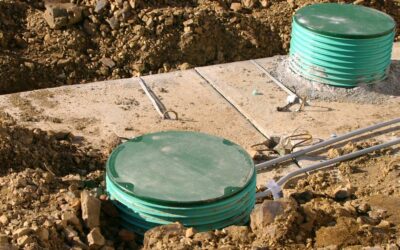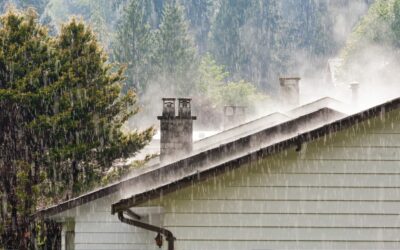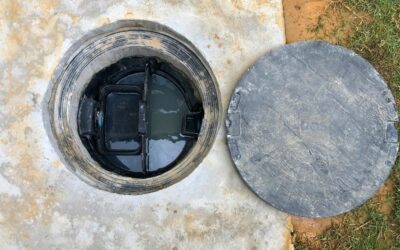Curious about how to know if your septic tank is leaking? Don’t worry; we’ve got you covered. When unusual issues arise in your yard or plumbing, it might be a sign of trouble.
In straightforward terms, a septic tank leak isn’t just a minor inconvenience; it’s a serious issue demanding immediate attention. This guide will not only help you identify a leak but also emphasize the importance of early detection.
Additionally, it guides the initial steps to take, helping you avoid potential damage and health risks. Being informed about new septic systems and what to look for can save you from the stress of major repairs and ensure the smooth operation of your septic system.
4 Powerful Signs: How Do You Know if Your Septic Tank is Leaking?
- Pungent Odor: A strong sewage smell is a definite red flag.
- Vibrant Grass: If the grass around your septic tank area is growing excessively or looks unusually lush, there could be an issue.
- Damp Yard: An unexpectedly wet or waterlogged yard may signal a problem.
- Sluggish Drains: If sinks, showers, and toilets are draining slowly, it’s a clear sign that something is amiss.
Recognizing these signs early is crucial for understanding how to know if your septic tank is leaking. A leaking septic tank can have environmental repercussions, pose health risks, and lead to costly repairs if not addressed promptly.
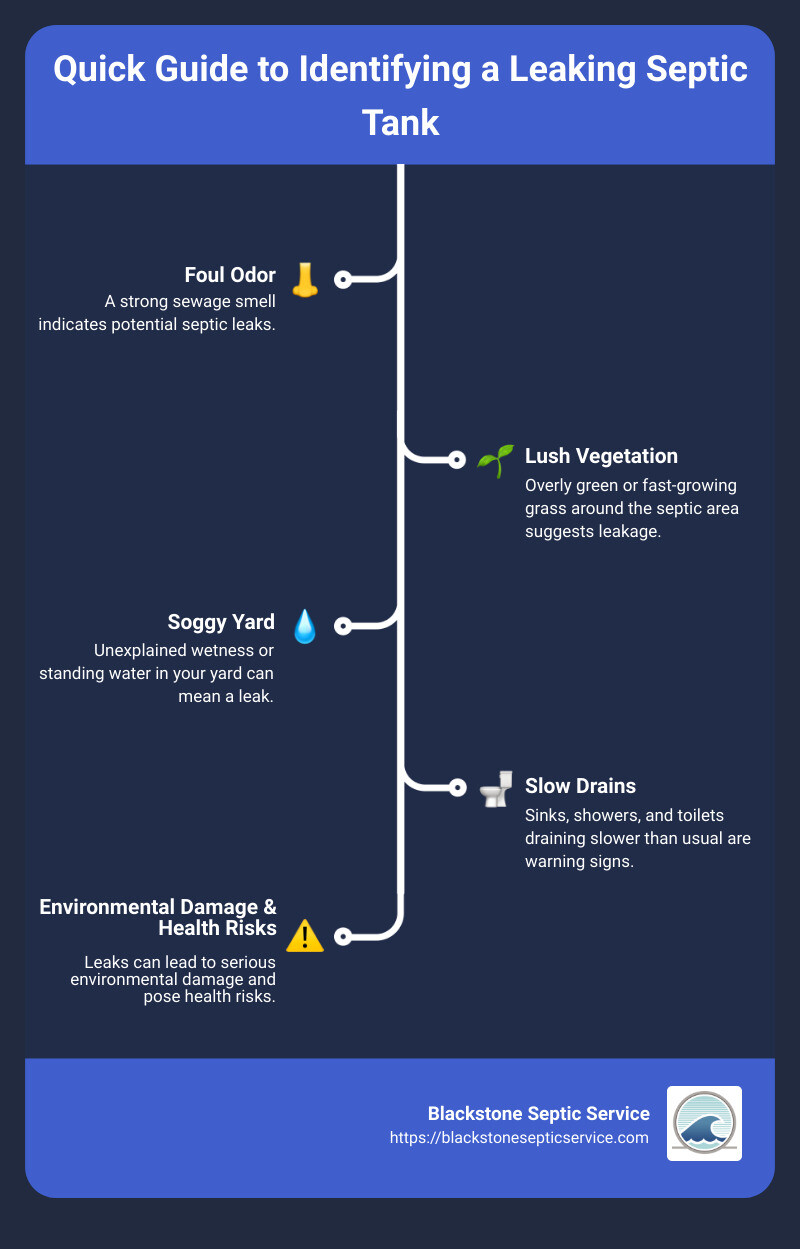
Table of Contents
Recognizing the Signs of a Leaking Septic System
When it comes to how do you know if your septic tank is leaking, several tell-tale signs can alert you early on. Let’s dive into these signs so you can spot them quickly.
Foul Odor
One of the most noticeable signs is a foul odor. If you start smelling something that resembles sewer gases around your property, it’s time to pay attention. This smell can come from the tank itself, the drain field, or even your neighbor’s system if you live nearby.
Lush Vegetation
Have you noticed lush, green grass around your septic tank or drain field, especially if the rest of your lawn is not as vibrant? This could be a sign that your septic tank is leaking nutrients into the soil, acting as a fertilizer.
Soggy Yard and Standing Water
A soggy yard or standing water around your septic tank area is a red flag. This could indicate that water is escaping from your tank and saturating the ground.
Slow Drains and Gurgling Sounds
Inside your home, slow drains or gurgling sounds from your plumbing can be symptoms of a backup or a blockage, typically caused by a leaking septic tank.
Water Contamination and Health Risks
Leaks can lead to water contamination. If your well water starts to taste or smell bad, it’s crucial to test it for contaminants. Leaking septic tanks can introduce harmful pathogens into the drinking water supply, posing serious health risks to you and your family.
Recognizing these signs early on can prevent a small leak from becoming a big problem. If you notice any of these symptoms, it’s crucial to act quickly to mitigate potential damage and health risks. In the next section, we’ll explore the common causes of septic tank leaks to help you understand why these issues occur.
Common Causes of Septic System Leaks
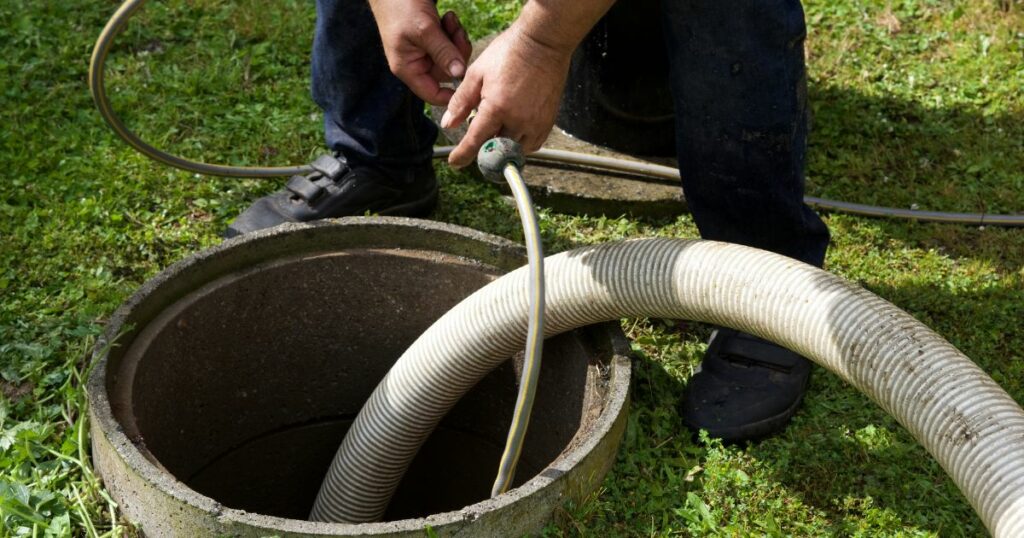
When it comes to understanding how do you know if your septic tank is leaking, it’s just as important to know why it might be leaking. Let’s dive into the common culprits behind septic tank leaks.
Age of System
Like most things, septic systems don’t last forever. The typical lifespan of a conventional septic system is around 25-30 years. After this period, materials can deteriorate, leading to potential leaks. It’s a natural process, but knowing the age of your system can help you anticipate and mitigate issues before they arise.
Physical Damage
Physical damage is another common cause of leaks. This can happen in several ways:
- Heavy machinery driving over the tank area
- Tree roots growing into and cracking the tank walls
- Accidental damage during yard work or construction
Improper Maintenance
Regular maintenance is key to a healthy septic system. If a tank isn’t pumped out regularly (every 2-5 years, depending on your province and household size), it can lead to clogs and backups, eventually causing leaks. Skipping routine inspections and maintenance is like inviting trouble.
Overuse
Every septic system has its limits. If water usage exceeds the system’s capacity, it can stress the tank and drainage field, leading to leaks. This is often seen in homes with significantly more occupants than the system was designed for or where water conservation measures are not practiced.
Environmental Factors
Nature can play a role in septic system health. Extreme weather conditions like heavy rainfall, flooding, or rapid snowmelt can overload the system. High groundwater levels can also pressure the system, potentially causing leaks.
Construction Errors
Lastly, mistakes made during the installation of a septic system can lead to future leaks. Incorrectly installed pipes, tanks, or drain fields can fail prematurely. It’s crucial to work with reputable professionals who have a track record of quality installations.
Preventing leaks starts with understanding these common causes. By being mindful of the age of your system, avoiding physical damage, keeping up with maintenance, managing water use, considering environmental impacts, and ensuring proper installation, you can extend the life of your septic system and avoid many common issues.
In the next section, we’ll discuss how to diagnose a leaking septic tank, so you can take action if you suspect a problem with a leaking tank.
How to Diagnose a Leaking Septic Tank
Diagnosing a leaking septic tank is crucial for maintaining a healthy septic system and preventing environmental damage. Here’s how you can identify and address leaks effectively.
Inspection Methods
Visual Inspection: Start with a simple walk around your property. Look for signs of lush vegetation, soggy areas, or standing water near your septic tank and drain field. These could indicate a leak.
Check for Odors: A foul smell is a telltale sign. If you notice sewage odors in your yard, especially around the septic tank or drain field, it’s time to investigate further.
Professional Assessment
Hiring a professional like Blackstone Septic Service is the most reliable way to diagnose a leaking septic tank. Experts use specialized equipment to inspect the tank and identify leaks, even those that aren’t immediately visible.
DIY Checks
While professional help is recommended, there are a few checks you can do yourself:
- Monitor Water Usage: Unusually high water usage can sometimes indicate a leak in your septic system.
- Listen for Gurgling Sounds: Odd noises from your plumbing could suggest a problem with your septic tank.
Technology Use
Professionals may use technology like septic tank cameras to inspect the inside of the tank. This method allows them to spot cracks, leaks, or other damages without excavation.
Warning Signs
Be on the lookout for these warning signs:
- Slow Drains: If your sinks or toilets drain more slowly than usual, it could be a sign of a septic tank issue.
- Water Puddles: Unexplained water puddles in your yard, especially after dry weather, could indicate a leak.
- Healthy Grass: A patch of grass that’s greener or grows faster over your drain field could mean your septic tank is leaking.
Remember, early detection is key to preventing major issues. If you suspect your septic tank is leaking, don’t wait. Contact a professional like Blackstone Septic Service for a thorough assessment and peace of mind.
Preventative Measures and Maintenance
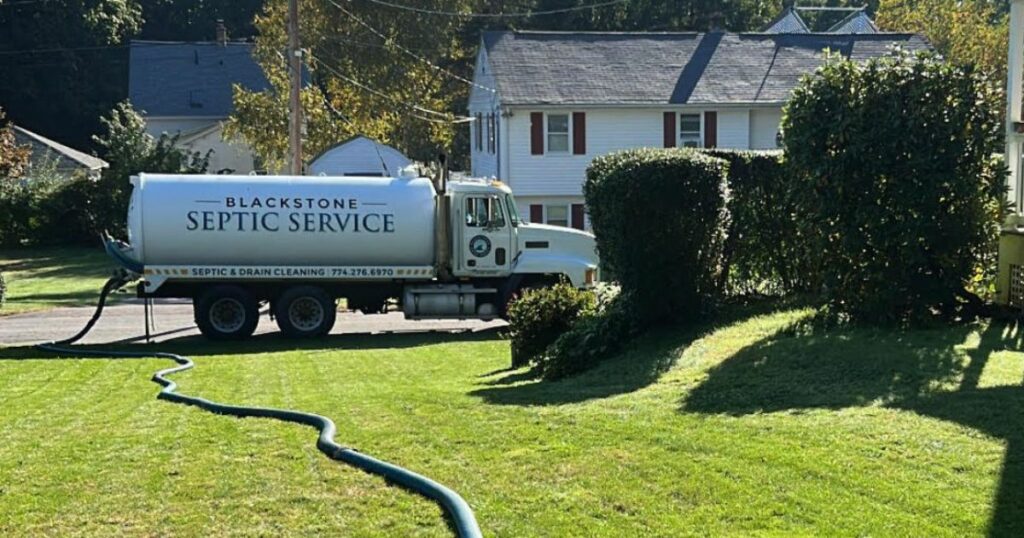
Preventing a septic tank leak is far easier and less costly than fixing one. Here’s how you can keep your septic system in top shape:
Routine Inspections
Regular check-ups are crucial. Just like you wouldn’t skip a yearly doctor’s visit, your septic system needs regular check-ups too. Experts recommend having your septic system pumped and inspected every two to three years. This can catch problems before they become major issues.
Proper Usage
Your septic system isn’t a trash can. Avoid flushing anything other than human waste and toilet paper. Items like wipes, feminine hygiene products, and other non-biodegradable materials can clog your system. Also, be mindful of what goes down your drains. Grease, for instance, can solidify and cause blockages.
Avoiding Chemicals
Harsh chemicals can kill the beneficial bacteria in your septic tank. These bacteria are essential for breaking down solid waste well. When using household cleaners, opt for septic-safe products. Limit the use of bleach and avoid pouring chemical drain cleaners, pesticides, or paints down your drains.
Water Conservation
Too much water entering your septic system can overwhelm it, leading to potential leaks. Simple changes can make a big difference. Fix leaky faucets, use water-efficient fixtures, and spread out laundry days to avoid sending too much water into the system at once.
Repairing Leaking Septic Tanks
When you find out your septic tank is leaking, it’s crucial to act fast. Leaks can cause significant damage to your property and the environment. Here’s what you need to know about fixing a leaking septic tank.
Temporary Fixes
In some cases, a temporary fix may be necessary to stop the immediate effects of a leak. This could include:
- Pumping the Tank: Removing excess water can reduce pressure on the tank and prevent further leakage temporarily.
- Sealing Visible Cracks: Products are available that can seal small cracks temporarily. However, this is not a long-term solution.
These are stop-gap measures. They won’t solve the underlying problem.
Long-term Solutions
For a lasting fix, you need to address the root cause of the leak. This might involve:
- Repairing or Replacing Damaged Pipes: Sometimes, the leak isn’t in the tank itself but in the pipes leading to or from it.
- Installing a New Tank: If the tank is old or extensively damaged, replacement might be the only option.
Professional Services
Repairing or replacing a septic tank is not a DIY job. It requires professional assessment and intervention. Companies like Blackstone Septic Service have the expertise to diagnose the problem accurately and recommend the most effective solution. They can handle everything from minor repairs to full system replacements.
Blackstone Septic Service
When in doubt, call the professionals. Blackstone Septic Service offers 24/7 emergency services, routine maintenance, and inspections. They can handle everything from minor repairs to full system replacements. A well-maintained septic system can last up to 40 years!
Preventative maintenance not only extends the life of your septic system but also protects your property and the environment. By following these measures and relying on professional services like Blackstone Septic Service, you can ensure your system remains healthy and leak-free.
Next up, let’s explore how to address leaks when they do occur.
Conclusion
When it comes to your septic system, staying alert and informed is key. Knowing how to recognize the early signs of a potential leak can save you from costly repairs and environmental hazards down the line. A small issue with your septic tank can quickly escalate into a significant problem, affecting not just your property but also the health of your family and the surrounding ecosystem.
That’s where the importance of professional help comes into play. Trying to tackle septic system issues on your own can be overwhelming and, if not done correctly, could lead to further damage. Professionals are equipped with the knowledge, tools, and experience to diagnose and resolve issues efficiently and effectively.
At Blackstone Septic Service, we understand the intricacies of septic systems. Our team of experts is committed to providing top-notch service to ensure your septic system operates smoothly. Whether it’s routine maintenance, emergency repairs, or inspections to prevent future leaks, we’ve got you covered.
In conclusion, the vigilance of septic tank owners, combined with the expertise of professionals like those at Blackstone Septic Service, is crucial in maintaining a healthy septic system.
If you suspect your septic tank is leaking or simply want to stay ahead with preventative care, don’t hesitate to reach out to us at Blackstone Septic Service. Together, we can protect your home, health, and the environment.
Frequently Asked Questions about Septic System Leaks
When it comes to understanding how do you know if your septic tank is leaking, you might have a few questions. Let’s dive into some of the most common queries homeowners have.
Can a leaking septic tank contaminate my well water?
Yes, it can. A leaking septic tank can release untreated sewage into the ground. This sewage can then seep into the groundwater, contaminating it. If your well draws from this groundwater, it could become contaminated with untreated wastewater too.
This is a health risk because the contaminated water could contain harmful bacteria and viruses.
Is it possible to repair a septic tank leak without replacing the entire system?
Absolutely. Not all leaks mean you need a new septic system. Sometimes, the leak can be due to a specific component failure, like a broken pipe or a crack in the tank itself. In such cases, repairing or replacing the faulty component can solve the problem. However, it’s crucial to have a professional assess the situation. They can tell you whether a repair is sufficient or if more extensive measures are necessary.
How often should I inspect my septic tank to prevent leaks?
Regular inspections are key. It’s recommended to have your septic tank inspected at least once every three years by a professional. However, if your system includes mechanical components, like pumps, you might need more frequent inspections – about once a year. Regular maintenance can prevent leaks and extend the life of your septic system.
In summary, a leaking septic tank can pose significant risks to your health and property. If you notice any signs of a leak, it’s vital to act quickly. Regular inspections and maintenance by professionals like Blackstone Septic Service can help keep your system functioning correctly and prevent leaks before they become a bigger problem.
Our Content
Our experienced septic tank specialists have carefully reviewed and edited all of the content to ensure that it meets our high standards for quality and accuracy. At Blackstone Septic Service, our mission is to provide excellent septic services. With a dedicated team of professionals committed to delivering top-tier solutions, we specialize in septic tank system services encompassing everything from Massachusetts septic tank pumping and installations for septic tanks.
Customer satisfaction is at the core of our operations, and we pride ourselves on our prompt, reliable, full-service provider and customer-centric approach. Blackstone Septic Service is a family-owned company with highly trained technicians, with over 75 years of experience in septic tanks.

